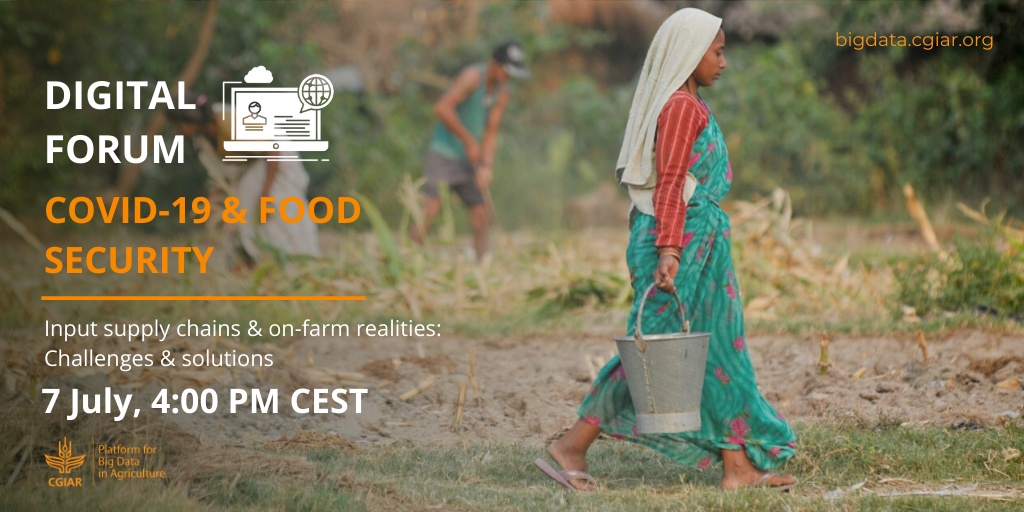30 June 2020. The first episode of the Discussion Series: Big data solutions to COVID-19 & food security, brought together experts to give an overview of the challenges presented by COVID-19 and the opportunities big data solutions present.
On the platform for Big data website are the main take-aways from each of the speakers.
 Sara Mbago-Bhunu - Director, East and Southern Africa Division, International Fund For Agricultural Development (IFAD)
Sara Mbago-Bhunu - Director, East and Southern Africa Division, International Fund For Agricultural Development (IFAD)
Sara’s work experience spans more than 20 years in the agriculture sector across Central, East and Southern Africa. She has worked on agriculture policy and sector reviews, value chain development, access to agricultural finance, social enterprise models and the promotion of small and medium-sized enterprises in peri-urban and rural areas
 Andy Jarvis - Associate Director-General, Bioversity International and CIAT alliance and co-founder of the CGIAR Platform for Big Data in Agriculture. In addition to the above roles, Andy is Flagship Leader on the CGIAR Research Program for Climate Change, Agriculture and Food Security (CCAFS), based in Cali, Colombia. He has extensive experience with cutting-edge scientific research in developing countries to support the goals of alleviating poverty and protecting essential ecosystem services of importance to humanity.
Andy Jarvis - Associate Director-General, Bioversity International and CIAT alliance and co-founder of the CGIAR Platform for Big Data in Agriculture. In addition to the above roles, Andy is Flagship Leader on the CGIAR Research Program for Climate Change, Agriculture and Food Security (CCAFS), based in Cali, Colombia. He has extensive experience with cutting-edge scientific research in developing countries to support the goals of alleviating poverty and protecting essential ecosystem services of importance to humanity.
 Natalia Pshenichnaya - Head of the AgriTech and CleanTech Programmes at GSMA
Natalia Pshenichnaya - Head of the AgriTech and CleanTech Programmes at GSMA
Natalia oversees GSMA’s portfolio of projects across Africa and Asia and has been working on mobile solutions for rural environments since 2010. As GSMA documents best practice in the use of digital tools for agriculture, they are looking closer at how COVID-19 facilitates the adoption of technology in agricultural value chains. In particular they are examing the increase in demand for specific digital solutions, such as mobile money and e-commerce.
7 July 2020. The second episode focused on challenges and solutions to input supply chains & on-farm realities.

Berber Kramer | International Food Policy Research Institute (IFPRI)
Berber’s research focuses on financial inclusion and resilience, in particular on innovations in agricultural insurance and seed systems that can help smallholder farmers adapt to climate change. She leads a research program that aims to strengthen agricultural insurance and finance in Ethiopia, India and Kenya through picture-based crop insurance. She is also a recent winner of our Inspire Challenge Rapid Response grant for her project that seeks to mitigate the impact of the COVID-19 pandemic.

Chiamaka Ndukwu | AgroHive
Chiamaka Ndukwu is the Founder/CEO of AgroHive, a Nigerian agritech company that provides agricultural businesses and farmers with appropriately trained personnel that meet their labour and skill needs. She has plans for a big data/digital project to visit major agrarian communities, starting in Nigeria, and teach farmers the basics in deploying technology in food production and how to accurately collect farm data.

Richard Choularton | Tetra Tech
Richard Choularton is a senior associate focused on food security and climate resilience with Tetra Tech International Development Services. As former Chief of the World Food Programme’s Climate and Disaster Risk Reduction Unit, he is a recognized expert in climate change adaptation and risk mitigation, resilience, food security, emergency preparedness, and early warning systems. Richard previously served as director of the Office of Humanitarian Assistance at CHF International. He was also the decision and planning support advisor for the Famine Early Warning Systems Network (FEWS NET).

Susan Mathew | International Trade Analyst
Susan is an international trade analyst and researcher with over a decade of experience in agriculture trade and regional value chains. She has served at multiple policy and implementation positions in South Asia from diplomatic missions, national and state governments, and grassroots research organizations.
Recording forthcoming.
In times of crisis, big data tools can help us make sense of and respond to crises with agility and accuracy. From using satellite remote sensing to monitor crop harvests to leveraging social media data to track population dynamics that may influence the spread of disease, big data tools and approaches have been instrumental in sensing and responding to the pandemic’s impacts on global food security and supply chains.
As we begin recovering and (re)building resilient food systems, we must leverage the power of big data to examine concepts of resilience and inform our understanding of how digital dynamism enables adaptive food systems in the face of shocks, and, in the longer term, addresses systemic issues in agriculture that have been exacerbated by the COVID-19 crisis.
The first panel, held 30 June, brought together four experts to introduce the theme of the discussion series, giving a general overview of the challenges presented by the COVID-19 pandemic and the potential opportunities big data solutions present for re-building food systems into more resilient, sustainable ones.
As we begin recovering and (re)building resilient food systems, we must leverage the power of big data to examine concepts of resilience and inform our understanding of how digital dynamism enables adaptive food systems in the face of shocks, and, in the longer term, addresses systemic issues in agriculture that have been exacerbated by the COVID-19 crisis.
The first panel, held 30 June, brought together four experts to introduce the theme of the discussion series, giving a general overview of the challenges presented by the COVID-19 pandemic and the potential opportunities big data solutions present for re-building food systems into more resilient, sustainable ones.

Sara’s work experience spans more than 20 years in the agriculture sector across Central, East and Southern Africa. She has worked on agriculture policy and sector reviews, value chain development, access to agricultural finance, social enterprise models and the promotion of small and medium-sized enterprises in peri-urban and rural areas


Natalia oversees GSMA’s portfolio of projects across Africa and Asia and has been working on mobile solutions for rural environments since 2010. As GSMA documents best practice in the use of digital tools for agriculture, they are looking closer at how COVID-19 facilitates the adoption of technology in agricultural value chains. In particular they are examing the increase in demand for specific digital solutions, such as mobile money and e-commerce.
 Brian King - Coordinator of the CGIAR Platform for Big Data in Agriculture. Brian King leads the Platform for Big Data in Agriculture, a global programme of the CGIAR consortium centred on digital transformation of food systems worldwide. Brian has led programmes leveraging transformational digital technologies, mostly in developing economies, to establish early internet networks and policies, build sustainable rural internet and license mobile operators, among others.
Brian King - Coordinator of the CGIAR Platform for Big Data in Agriculture. Brian King leads the Platform for Big Data in Agriculture, a global programme of the CGIAR consortium centred on digital transformation of food systems worldwide. Brian has led programmes leveraging transformational digital technologies, mostly in developing economies, to establish early internet networks and policies, build sustainable rural internet and license mobile operators, among others.
7 July 2020. The second episode focused on challenges and solutions to input supply chains & on-farm realities.
Berber Kramer | Research Fellow, International Food Policy Research Institute (IFPRI)
Berber Kramer | International Food Policy Research Institute (IFPRI)
Berber’s research focuses on financial inclusion and resilience, in particular on innovations in agricultural insurance and seed systems that can help smallholder farmers adapt to climate change. She leads a research program that aims to strengthen agricultural insurance and finance in Ethiopia, India and Kenya through picture-based crop insurance. She is also a recent winner of our Inspire Challenge Rapid Response grant for her project that seeks to mitigate the impact of the COVID-19 pandemic.

Chiamaka Ndukwu | Founder and CEO, AgroHive
Chiamaka Ndukwu | AgroHive
Chiamaka Ndukwu is the Founder/CEO of AgroHive, a Nigerian agritech company that provides agricultural businesses and farmers with appropriately trained personnel that meet their labour and skill needs. She has plans for a big data/digital project to visit major agrarian communities, starting in Nigeria, and teach farmers the basics in deploying technology in food production and how to accurately collect farm data.

Richard Choularton | Director of Agriculture and Economic Growth Sector, Tetra Tech
Richard Choularton | Tetra Tech
Richard Choularton is a senior associate focused on food security and climate resilience with Tetra Tech International Development Services. As former Chief of the World Food Programme’s Climate and Disaster Risk Reduction Unit, he is a recognized expert in climate change adaptation and risk mitigation, resilience, food security, emergency preparedness, and early warning systems. Richard previously served as director of the Office of Humanitarian Assistance at CHF International. He was also the decision and planning support advisor for the Famine Early Warning Systems Network (FEWS NET).

Susan Mathew | International Trade Analyst
Susan Mathew | International Trade Analyst
Susan is an international trade analyst and researcher with over a decade of experience in agriculture trade and regional value chains. She has served at multiple policy and implementation positions in South Asia from diplomatic missions, national and state governments, and grassroots research organizations.
Forthcoming:
19-23 October 2020. Digital Dynamism for Adaptive Food Systems.
The need for resilient food systems comes into stark relief during a crisis. Responses must be agile and adaptive, facilitating the quickest possible recovery while equipping these systems to adaptively manage or avert crises in the future.
The event theme, Digital Dynamism for Adaptive Food Systems, will examine food system resilience and highlight how digital tools and technologies can help us sense, respond and (re)build better systems in times of global food security crises.
The event theme, Digital Dynamism for Adaptive Food Systems, will examine food system resilience and highlight how digital tools and technologies can help us sense, respond and (re)build better systems in times of global food security crises.



No comments:
Post a Comment